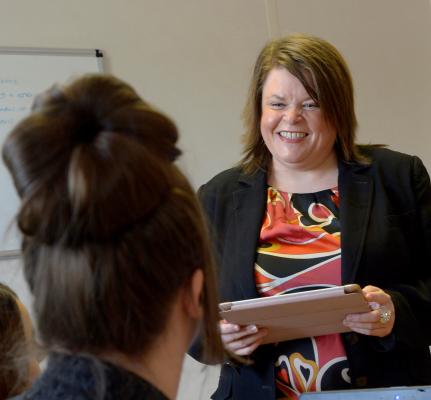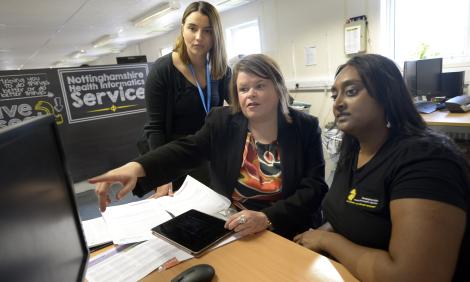Digital education, training and development
Digital educators and trainers support NHS organisations by educating their workforce on how to implement, develop and use digital tools.
Working in digital education and training in health
NHS digital educators develop and deliver education and training that improves the digital skills of NHS staff. .
You may have a wide range of responsibilities from training hospital staff to implement an electronic patient record to improving general practice staff’s digital confidence.
You will contribute to inclusive and accessible education, training and development that caters for all levels of digital literacy.
You’re develop an understanding of various technologies in your role including:
• learning management systems
• virtual learning environments
• augmented reality technologies.
There is evidence that high-quality education is one of the most cost-effective ways of improving the impact of digital technologies in healthcare.
Whatever your role, you’ll be making a difference to patients by helping staff use digital services in the NHS.
Roles in education and training
Clinical education
You’ll be a healthcare professional and use your skills to help other healthcare professionals get the digital skills they need.
You could be training them how to use new technologies such as an electronic prescribing and medications administration system.
Non-clinical education
Your role could be to bring together NHS staff who believe in the power of digital technology and are willing to champion it across your organisation. You may deliver digital literacy training or help people find more specialist digital leadership training.
Whether you are in clinical or non-clinical education, the following three roles are typical across the NHS.
Explore some of the roles in education and training in health informatics:
Training administrator
You’ll provide administrative support for the IT training department. Your work may include::
- publicising available training courses
- scheduling courses and coordinating bookings
- maintaining training records, resources and websites
- providing certificates of attendance, completion and knowledge
Trainer
You’ll have a variety of responsibilities that could include
- identifying learning needs
- designing and developing training materials and resources
- planing and delivering training
- supporting and assessing learners
Training manager
You’ll usually be in a senior position. You’re likely to be responsible for:
- planning, delivering and evaluating a range of training and development programmes
- working with a wide range of staff to identify future training requirements and providing advice on provision
- managing the training team
Claire Garner
Digital Workforce Development Manager
Read Claire's storyI love supporting and developing staff to reach their potential.

How much can I earn
You’ll most likely be employed on a national pay and conditions system called Agenda for Change (AfC).
Education roles are available at all levels. Entry roles start at bands 2 - 5 through to senior education roles at band 8.
How about the benefits
- Make a difference and contribute to the successful digital transformation of the NHS
- Flexible and part-time working
- Good opportunities for progression
- Thriving education profession
- Excellent pension scheme
- Good holiday entitlement, increasing with service
- NHS discounts in shops and restaurants
Must have skills
Depending on the role, you may need the following skills
- Basic knowledge of best practice training and education
- Be able to deliver training to a wide range of people
- A curiosity and confidence to learn about and use technology in the delivery of education
- Good performance measurement skills
- Ability to identify and put together good training and education content
- A willingness to learn how to improve an education service
How to become part of the digital education team
You’ll need sound IT skills and a minimum of at least five GCSEs, including English and maths to work as a training administrator.
As with any profession, you will need to continuously develop your knowledge, skills, attitude, behaviours, and values to progress your career. You may not need a degree for some entry-level roles, but depending on your role you may need:
- experience in delivery and improving service across multiple teams
- a foundation degree, higher national certificate/diploma, masters’ degree or equivalent experience
If you are interested in becoming an educator, you can find more information on the websites of professional bodies that support these roles, such as the:
You can also seek out mentoring opportunities, develop experience by volunteering to support informal education initiatives and keep an eye out for roles on NHS Jobs.
What are my chances of starting a career in education in digital health
Digital education and training in health is a growing profession and vacancies are frequently advertised. The NHS is now adopting career pathways in education, training and development.
You can make the move into this career straight from school, university or switch from other roles. Many administrators make the move into education, training and development.
If you are a clinician, you may make the move into an education, training and development role either because of your passion for a specific digital tool or digital more broadly.
Most clinician-facing digital education programmes are now led by clinicians themselves.
Where a career as an educator in digital health can take you
Senior educators can lead change programmes across organisations or even the whole country or move into other senior roles such as organisational development, lecturing or into academia.
You may also choose to move into a role within the digital or HR/People profession, such as Learning, Development and Education, Digital and Analytics, Organisation Development or Leadership and Culture.





